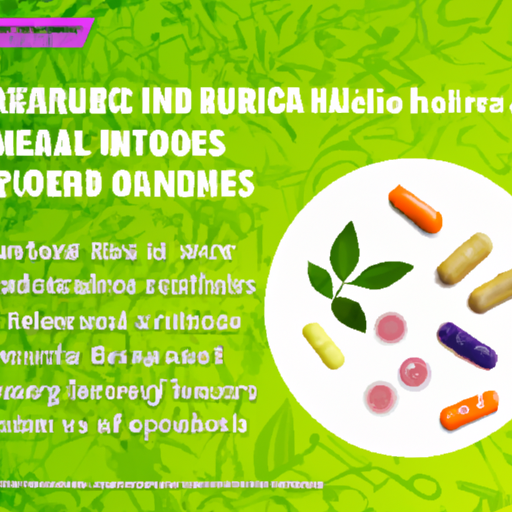You’ve probably heard about herbal supplements before, but do you know what benefits they offer? In this article, we’ll explore the numerous advantages of incorporating herbal supplements into your daily routine. From boosting your immune system to improving digestion and promoting overall well-being, these natural remedies have been praised for their potential health benefits for centuries. So, if you’ve been curious about the advantages of herbal supplements, keep reading to discover what they can do for you.
Understanding Herbal Supplements
Herbal supplements have gained significant popularity in recent years due to their potential health benefits and natural healing properties. These supplements are derived from plants and contain various nutrients, vitamins, and minerals that can support overall well-being. Understanding the definition and common types of herbal supplements can provide invaluable knowledge on their uses and potential advantages for your health.
Definition of Herbal Supplements
Herbal supplements, also known as botanical supplements or phytomedicines, are natural products made from plant extracts. These supplements can come in various forms such as capsules, tablets, powders, or teas, allowing for convenient consumption. Unlike pharmaceutical drugs, which are synthetically manufactured, herbal supplements are derived from plant sources, making them a more natural alternative for promoting health and wellness.
Common Types of Herbal Supplements
There is an extensive range of herbal supplements available on the market, each with its unique set of properties and potential benefits. Some of the most common types of herbal supplements include:
-
Ginseng: Known for its ability to enhance energy and vitality, ginseng is often used to support physical stamina and combat fatigue.
-
Echinacea: This herb is commonly used to boost the immune system and protect against common illnesses like the flu or colds.
-
Turmeric: With its powerful anti-inflammatory properties, turmeric is often used to support joint health and alleviate symptoms of arthritis.
-
Gingko Biloba: This popular herbal supplement is known for its potential cognitive benefits, improving memory, focus, and mental alertness.
-
Milk Thistle: Used for centuries to support liver health, milk thistle is believed to have detoxifying properties and may help protect against liver damage.
-
Garlic: Garlic is known for its potential heart health benefits, such as reducing cholesterol levels and supporting cardiovascular function.
By understanding the various types of herbal supplements available, you can choose the ones that align with your health goals and needs.
Historical Use of Herbal Medicine
Herbal supplements have been used for thousands of years by early civilizations as a form of medicinal treatment. Ancient cultures from around the world, including Egypt, China, and India, recognized the healing properties of plants and incorporated them into their traditional medical practices.
Early Civilizations and Herbal Supplements
In ancient Egypt, records show that herbs and plants were extensively used for medicinal purposes. The Ebers Papyrus, one of the oldest medical texts, contains over 700 herbal remedies, showcasing the rich tradition of herbal medicine in this region.
Similarly, ancient China developed a sophisticated system of herbal medicine called Traditional Chinese Medicine (TCM). TCM emphasizes the use of herbal remedies alongside acupuncture and other holistic practices to restore balance and promote optimal health.
In India, the Ayurvedic tradition emerged, focusing on herbal remedies and natural healing modalities to address various health conditions. These approaches recognize the interconnectedness of the mind, body, and spirit, and aim to promote overall well-being and vitality.
Modern Revival of Herbal Medicine
In recent decades, there has been a resurgence of interest in herbal medicine, leading to a modern revival of these practices. With the growing recognition of the potential benefits of natural remedies and a desire for more holistic approaches to healthcare, herbal supplements have gained widespread popularity.
Many scientific studies have begun to explore the efficacy and safety of herbal supplements, helping to validate centuries-old traditional practices. This increased scientific interest has provided a solid foundation for the integration of herbal medicine into conventional healthcare, making it more accessible and accepted.

This image is property of images.unsplash.com.
Nutritional Value of Herbal Supplements
One of the key advantages of herbal supplements is their rich nutritional value. These supplements are often packed with essential vitamins, minerals, and antioxidants that can contribute to overall health and well-being.
Enriched with Vitamins and Minerals
Different herbal supplements contain varying amounts of vitamins and minerals, depending on the plant source. For example, moringa supplements are known for their high vitamin C and iron content, making them beneficial for boosting the immune system and preventing anemia.
Similarly, nettle leaf supplements are a rich source of vitamins A, C, and K, as well as minerals like calcium and potassium. These nutrients are vital for bone health, blood clotting, and maintaining healthy skin.
By incorporating herbal supplements into your daily routine, you can provide your body with a natural and easily absorbable source of essential nutrients.
Presence of Essential Antioxidants
Herbal supplements often contain high levels of antioxidants, which play a crucial role in protecting the body against harmful free radicals. Free radicals are unstable molecules that can damage cells, leading to various health issues and accelerating the aging process.
Antioxidants help neutralize these free radicals, reducing the risk of oxidative stress and cellular damage. Common herbal supplements rich in antioxidants include green tea extract, grape seed extract, and bilberry extract.
The presence of antioxidants in herbal supplements not only supports overall health but also contributes to improved skin health, reduced inflammation, and enhanced immune function.
Natural Healing Properties
One of the primary reasons people turn to herbal supplements is their natural healing properties. These supplements have been used for centuries to support various aspects of health and promote the body’s innate ability to heal itself.
Herbal Supplements and Immunity
A strong immune system is essential for maintaining good health and preventing illness. Herbal supplements like echinacea, astragalus, and elderberry are well-known for their immune-boosting properties.
Echinacea, in particular, has been extensively studied for its potential to enhance immune function and decrease the severity and duration of common cold symptoms. Regular intake of echinacea supplements can help strengthen your immune system and reduce the likelihood of falling ill.
Additionally, astragalus supplements have been used in traditional Chinese medicine to support the immune system and enhance resistance to infections. These herbal supplements can help fortify your immune defenses, keeping you healthy and reducing the risk of recurring illnesses.
Promoting Overall Bodily Function and Healing
Herbal supplements can also support overall bodily function and aid in the healing process. Some herbal supplements, such as ginger and peppermint, can help alleviate digestive issues like bloating, indigestion, and nausea.
Ginger, in particular, has been used for centuries to soothe an upset stomach and promote healthy digestion. Its natural anti-inflammatory properties can also help reduce inflammation in the gut, alleviating symptoms of conditions like irritable bowel syndrome (IBS).
Furthermore, herbal supplements like chamomile and lavender have calming properties that can relax the mind and body, promoting a sense of peace and aiding in sleep quality. These natural remedies can be a great alternative to pharmaceutical sleep aids, helping you achieve a restful night’s sleep without the risk of dependence or side effects.
By incorporating herbal supplements into your wellness routine, you can tap into their natural healing properties and support your body’s innate ability to restore balance and function optimally.

This image is property of images.unsplash.com.
Holistic Approach to Health
Herbal supplements offer a holistic approach to health, addressing not only physical well-being but also emotional and spiritual aspects. By nurturing the mind, body, and spirit, these supplements can contribute to a comprehensive and balanced approach to overall wellness.
Mind-Body-Spirit Benefits
Herbal supplements can positively impact mental and emotional well-being, promoting a sense of calm, clarity, and overall tranquility. Many herbal supplements, such as lavender, lemon balm, and passionflower, have calming properties that can help reduce anxiety, stress, and promote relaxation.
Additionally, adaptogenic herbs like ashwagandha and rhodiola can help the body adapt to stress and support emotional resilience. These herbal supplements can be particularly beneficial for individuals experiencing chronic stress or dealing with emotional imbalances.
By nurturing the mind, body, and spirit, herbal supplements can help foster overall well-being and alleviate the physical and mental tolls of daily life.
Long-Term Health Effects
Unlike many conventional medications that may provide temporary relief but come with potential side effects, herbal supplements offer the opportunity for long-term health benefits. By supporting the body’s natural healing mechanisms and promoting balance, these supplements can contribute to sustainable health improvements over time.
When taken consistently and as part of a well-rounded wellness routine, herbal supplements can provide a foundation for long-term health and vitality. Whether you are looking to boost your immune system, support your digestion, or enhance cognitive function, incorporating herbal supplements into your lifestyle can be a valuable investment in your well-being.
Cognitive Benefits of Herbal Supplements
In addition to their physical health benefits, herbal supplements can also have positive effects on cognitive function and mental well-being.
Boosting Mental Alertness
Certain herbal supplements have been shown to enhance mental alertness and improve focus and concentration. Ginseng, for example, has traditionally been used to support cognitive function and memory.
Ginseng supplements contain active compounds called ginsenosides, which have been found to improve mental performance, attention, and working memory. By incorporating ginseng into your routine, you can enhance your cognitive abilities and feel more mentally sharp.
Promoting Better Memory and Concentration
Other herbal supplements, such as ginkgo biloba, have been studied for their potential to improve memory and overall cognitive function. Ginkgo biloba supplements contain flavonoids and terpenoids that have antioxidant properties, promoting healthy blood flow and offering neuroprotective benefits.
Regular consumption of ginkgo biloba supplements may enhance memory retention, boost concentration, and increase mental clarity. Whether you are a student studying for exams or an adult looking to maintain cognitive sharpness, ginkgo biloba can be a valuable supplement.
By incorporating these herbal supplements into your routine, you can experience improved cognitive function, enhanced memory, and increased mental alertness.
This image is property of images.unsplash.com.
Herbal Supplements for Physical Vitality
Physical vitality is crucial for maintaining an active and healthy lifestyle. Herbal supplements can provide support for enhanced energy, stamina, muscle strength, and flexibility.
Enhancing Energy and Stamina
If you often find yourself feeling fatigued or lacking energy, herbal supplements can provide a natural boost. Adaptogenic herbs like maca, Rhodiola rosea, and ashwagandha are known for their energizing properties and ability to combat fatigue.
Maca, a root native to Peru, has been used for centuries to enhance stamina and combat physical tiredness. It can also help improve mood and reduce symptoms of anxiety or depression.
Furthermore, Rhodiola rosea supplements have been shown to improve endurance, exercise performance, and reduce mental and physical fatigue. By incorporating these herbal supplements into your routine, you can experience increased energy levels and improved stamina to tackle daily challenges.
Promoting Muscular Strength and Flexibility
Herbal supplements can also support physical vitality by promoting muscular strength and flexibility. Boswellia serrata, for example, is a natural anti-inflammatory herb that may help alleviate joint pain and improve mobility.
By reducing inflammation, Boswellia serrata supplements can support joint health and flexibility, making it ideal for individuals experiencing joint stiffness or discomfort. Whether you are an athlete or simply looking to maintain an active lifestyle, herbal supplements can support your physical well-being and ensure optimal vitality.
Herbal Medication as Antioxidants
Antioxidant properties are a significant advantage of many herbal supplements, as they can help prevent cell damage and offer anti-aging effects.
Prevention of Cell Damage
Free radicals, the byproducts of various metabolic processes, can cause oxidative stress in the body. Over time, oxidative stress can lead to cell damage, inflammation, and an increased risk of chronic diseases such as heart disease, cancer, and neurodegenerative disorders.
Herbal supplements rich in antioxidants, such as green tea extract and grape seed extract, can neutralize free radicals, reducing the risk of oxidative stress and cell damage. These supplements can help protect and support the overall health and vitality of your cells.
Anti-Aging Effects
In addition to preventing cell damage, herbal supplements with antioxidant properties can also have anti-aging effects. The accumulation of oxidative stress and cell damage can accelerate the aging process, leading to wrinkles, fine lines, and a dull complexion.
Herbal supplements like resveratrol, found in red wine and certain berries, and pomegranate extract, offer potent antioxidants that can help combat signs of aging. By incorporating these supplements into your routine, you can support youthful-looking skin and overall longevity.
By harnessing the antioxidant powers of herbal supplements, you can protect your cells from damage, promote healthy aging, and maintain a vibrant and youthful appearance.

Use of Herbal Supplements for Preventive Care
Herbal supplements can be a valuable tool for preventive care, helping support specific aspects of your health and well-being.
Herbal Supplements for Heart Health
Cardiovascular health is vital for overall well-being, and herbal supplements can play a role in maintaining heart health. Hawthorn berry supplements, for instance, have traditionally been used to promote cardiovascular function and support healthy blood pressure levels.
Hawthorn berries contain active compounds that can dilate blood vessels, improve blood flow, and strengthen the heart muscle. Regular supplementation with hawthorn berry supplements can help maintain a healthy cardiovascular system, reducing the risk of heart-related conditions.
Similarly, garlic supplements have been shown to have positive effects on heart health by reducing cholesterol levels and improving circulation. The active compound in garlic, allicin, has been found to have anti-hypertensive properties that promote healthy blood pressure and prevent the development of cardiovascular diseases.
By incorporating these herbal supplements into your daily routine, you can take proactive steps to support your heart health and reduce the risk of complications.
Supplements for Digestive Health
Maintaining a healthy digestive system is crucial for overall well-being. Herbal supplements can be utilized to support digestion, relieve common digestive issues, and promote gut health.
Peppermint supplements, for example, have been commonly used to soothe an upset stomach and alleviate symptoms of indigestion and bloating. Peppermint oil, the main component of these supplements, has antispasmodic properties that can relieve muscle contractions in the gastrointestinal tract, reducing discomfort and digestive disturbances.
Additionally, ginger supplements can help promote healthy digestion and alleviate nausea. Gingerols and shogaols, active compounds in ginger, have been found to stimulate the digestive system, reduce inflammation, and alleviate symptoms of gastrointestinal distress.
By incorporating herbal supplements into your routine, you can support a healthy digestive system, alleviate common digestive issues, and enhance overall gut health.
Using Supplements for Holistic Prevention
Herbal supplements can be used as a holistic form of preventive care, addressing multiple aspects of health. By targeting specific areas such as heart health and digestive function, these supplements can be a valuable addition to a comprehensive wellness routine.
However, it is essential to note that herbal supplements should not replace a healthy lifestyle, including a balanced diet, regular exercise, and sufficient sleep. They should be used as part of a holistic approach to preventive care, supporting overall well-being and addressing specific health concerns.
Potential Risks and Considerations
While herbal supplements offer numerous potential benefits, it is crucial to be aware of potential risks and considerations associated with their use.
Possible Adverse Effects
Although herbal supplements are generally considered safe, certain individuals may be more susceptible to adverse effects or interactions with other medications. It is essential to consult with a healthcare professional before starting any new herbal supplements, especially if you have a pre-existing medical condition or are taking other medications.
Some herbal supplements, such as St. John’s wort, can interact with antidepressant medications, leading to adverse effects. Similarly, excessive consumption of certain herbs, such as licorice root, can cause high blood pressure or electrolyte imbalances.
Each herbal supplement carries its unique set of potential risks and side effects, making it essential to do thorough research and seek professional guidance.
Importance of Professional Consultation
To ensure the safe and appropriate use of herbal supplements, it is highly recommended to consult with a qualified healthcare practitioner or herbalist. They can evaluate your health history, current medications, and individual needs to offer informed recommendations and optimize the benefits of herbal supplements.
A healthcare professional can also help determine the correct dosage, highlight any potential interactions, and monitor your progress. This guidance is particularly important when considering herbal supplements for children, pregnant women, or individuals with specific health conditions.
Choosing Quality Supplements
When looking for herbal supplements, it is crucial to choose reputable brands that prioritize quality and safety. Look for supplements that have been independently tested for purity and potency, and opt for those derived from organic sources whenever possible.
Reading labels and familiarizing yourself with the ingredients is essential to ensure that the supplement does not contain any components that may trigger allergies or sensitivities.
Furthermore, it is advisable to consult customer reviews, seek recommendations from trusted sources, and consider professional advice when selecting herbal supplements.
By being diligent in your research, selecting high-quality supplements, and seeking professional guidance, you can minimize potential risks and maximize the benefits of herbal supplementation.
In conclusion, herbal supplements offer an array of potential benefits for your health and well-being. From their rich nutritional value to their natural healing properties, these supplements can contribute to a holistic approach to wellness, supporting physical, cognitive, and emotional vitality. However, it is important to be aware of potential risks, consult with professionals, and choose quality supplements to ensure their safe and effective use. By incorporating herbal supplements into your lifestyle, with the guidance of healthcare professionals, you can harness the power of nature to enhance your overall health and thriving.





